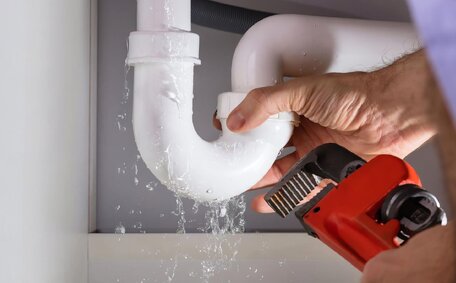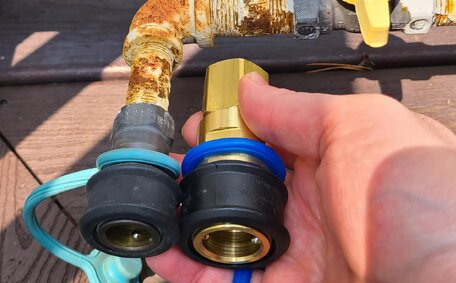Introduction to Gas Fitting
With over a decade of expertise, our team at Gladesville Plumbing understands how crucial gas fitting is to residential and commercial settings in Gladesville and across Sydney.
We specialise in a comprehensive range of gas services, including new gas line installation, gas leak detection and repair, gas heater servicing, and gas appliance installation and maintenance, utilising a suite of essential tools. Our fully certified gas plumbing experts have extensive skills and knowledge, ensuring every job is performed safely and effectively.
Read on for a detailed list of key tools and equipment that professional gas fitters rely on for everyday gas installation tasks.
Understanding the purposes of these items when working in the field will give you greater insight into the gas fitting trade.
Essential Hand Tools
Gas fitters rely on a selection of crucial tools and equipment for safe and efficient daily installation, maintenance, and repair tasks. Below is a list of essential hand tools commonly found in a gas fitter’s toolkit:
- Pipe wrenches - Adjustable pipe wrenches are used to securely grip and turn gas pipes and fittings during assembly or disassembly. They allow gas fitters to exert substantial torque when threading or unthreading pipe connections.
- Water pump pliers - These versatile water pump pliers, ranging from 200-250 mm in length, help gas fitters cut through, bend and adjust pipes, fittings and other job components. They can also be used to hold or turn objects, including the manipulation of pipes with tube benders.
- Allen keys - Various sizes of Allen keys are required to tighten loosen fittings such as gas appliance burner caps. They must withstand high temperatures around appliances.
- Hose crimper - An essential working plumber gas tool, the hose crimper, is crucial for creating secure joints in flexible gas hoses and ensuring the gas hose functions safely.
Other vital tools that gas fitters use include spanners, adjustable wrenches, cold chisels, utility knives, tape measures, tubing cutters, files, and keyhole saws. Mandatory personal protective equipment like thick leather gloves and safety goggles are essential for eye protection and handling sharp or heated materials.
High quality tools equipment, such as German or Japanese manufactured hand tools, offer durability and the capacity to handle any issues with reliability on the job. But above all, complying with the gas safety act, gas fitters must ensure they know how to properly select and handle each tool meticulously to use tools safely and adhere to safety regulations.
Pipe Wrenches
Pipe wrenches are indispensable in making gas fitters’ jobs more manageable. They primarily secure pipes and fittings of various sizes for applying the necessary torque during assembly or tightening. The adjustable jaw design means they can be used on a wide range of pipe diameters.
There are several common types of heavy-duty pipe wrenches used in gas fitting:
- Straight jaw pipe wrench - The parallel jaws offer excellent grip and strength for precisely adjusting straight runs of pipe.
- Chain pipe wrench - The chained jaw allows convenient right hand operation and is effective for accessing pipes in tight spaces.
- Aluminium pipe wrench - Much lighter yet still sturdy, making it ideal for extended overhead tasks.
Gas fitters must ensure they adjust wrenches for optimal grip on pipes, reducing the risk of slippage or pipe damage. Care should also be taken to avoid scratching or marking chrome fittings and appliance connections without any damage.
The ability a working plumber can master to competently handle pipe wrenches when connecting or securing gas infrastructure is essential for advancing your career in gas fitting. Choosing high-quality tools from reputable brands such as Stahlwille enables gas fitters to adhere to safe work practices and maintain efficiency over the long term.
Cutting Tools
Gas fitters use specialised cutting tools to accurately measure and prepare pipes for installation. Key gas hoses fittings, nuts bolts, and gas pipe cutting tools include:
- Pipe cutters - These cutting wheel tools allow precise straight cuts to correctly size the pipe. Quality brands like Ridgid ensure clean burr-free cuts.
- Hacksaws - For detailed trimming or shaping tasks on smaller pipes. A thin sharp blade on the hacksaw facilitates precise curved or angular cuts.
- Hole saws - Plunge hole saw drill bits neatly cut properly aligned fixture openings in walls and floors to feed pipework through.
Before beginning, it’s imperative to ensure that all markings and measurements are precise. Gas fitters must also frequently inspect hand power tools for dull teeth or wheels, replacing as necessary to maintain safety and efficiency. Keeping pipe cutting tools sharp and well-maintained is a continuous responsibility.
Proper handling and storage of cutting tools are crucial for on-site safety, as is wearing thick leather gloves during their operation. The right tools pipe cutting allow precise, versatile pipe preparations key to professional gas fitting work.
Joining and Sealing Tools
Gas fitting experts need to form secure, gas-tight joints, often employing press fitting techniques. Gas fitters employ various specialised tools to join pipes fittings sections and permanently seal connections.
Essential tools for plumbing and gas pipe joining include:
- Welding gear - Oxyacetylene welding, with the correct welding hose, allows very strong fusions to be made when joining pipe joints, changes of direction or transitions. Personal protective items like flashback arrestors and soldiering pads are mandatory gear.
- Soldering torches - Handheld propane torches apply heat to special alloys, creating seals on copper gas pipes with safety gear being crucial.
High-quality joining tools from leading brands guarantee precision and safety. Australian standards also dictate the approved compounds and tapes to permanently seal screwed pipe threads and prevent leaks, such as:
- Liquid and paste thread sealants
- Thread sealing tape
Skilful application of these specialised joining and sealing tools results in leak-proof connections that securely contain and regulate gas flow.
Testing and Safety Equipment
Adhering to safe gas fitting practices is essential for the welfare of tradespeople and the community. Gas fitters utilise various forms of safety gear and equipment to detect hazards and ensure compliance.
Key gas safety equipment includes:
- Electronic gas detectors - Portable inspection camera units using ultrasound to precisely locate minor gas leaks quickly. Models such as the GF300 Excel provide comprehensive testing before commissioning appliances.
- Safety goggles & gloves - Essential for protecting eyes from debris and hands from hot tools or caustic solvents.
- Safety cones & signage - Designating safe working clearance zones around work areas.
Rigorous standards require specific safety procedures, including purging methods to eliminate gas and air from pipes before use. Documenting all safety checks and compliance provides quality records.
Gas fitters have an obligation to always work safely. Investing in the right safety gear and upholding best practises protect your interests as well as the safety of both tradespeople and their customers.
Conclusion
In conclusion, proper gas fitting depends on an appropriate selection of plumbing tools and specialised safety equipment to conduct installations and repairs correctly. High-quality plumbing hand tools enable gas fitters to perform tasks such as sizing, bending, and sealing pipes efficiently.
Cutting tools ensure neat, accurate pipe preparations while electronic gas detectors effectively identify potentially dangerous leaks. Protective equipment provides a crucial barrier against hazards like heat, chemicals and debris.
Collectively, this essential equipment contributes to compliant and secure gas fitting practices in residential and commercial environments. Gladesville Plumbing, with a decade of experience serving Gladesville and its environs, boasts fully certified technicians equipped with premium tools.
Contact us at Gladesville Plumbing on 1300 349 338, email jobs@gladesvilleplumbingservice.com.au, or book online anytime for expert assistance with gas line installations, leak repairs, or appliance servicing. Our experts are ready to assist in ensuring the safety and efficiency of your gas systems.






